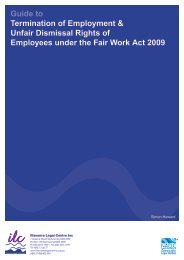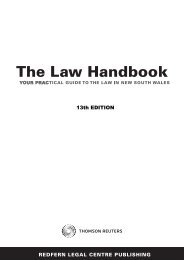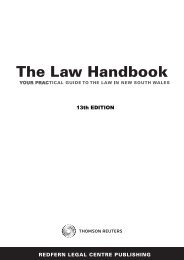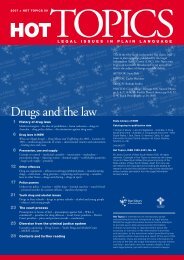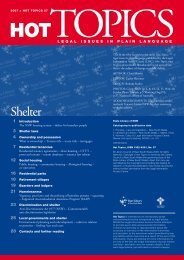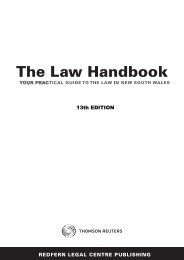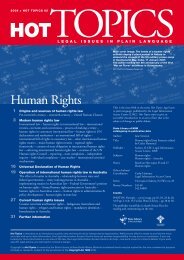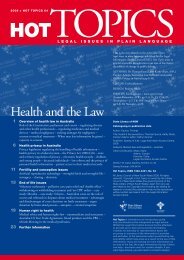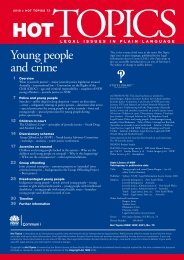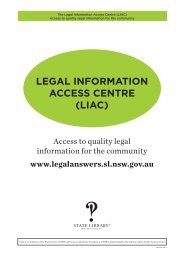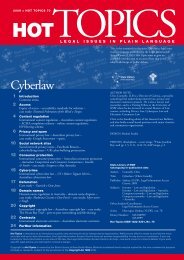Terrorism - Hot Topics 58 - Legal Information Access Centre
Terrorism - Hot Topics 58 - Legal Information Access Centre
Terrorism - Hot Topics 58 - Legal Information Access Centre
- No tags were found...
You also want an ePaper? Increase the reach of your titles
YUMPU automatically turns print PDFs into web optimized ePapers that Google loves.
can be invoked for the purpose of destroying otherpeople’s rights. A terrorist cannot, therefore, insist thattheir right to freedom of religion allows them to take thelives of non-believers.Importantly, some human rights can be suspended (or‘derogated’ from) in a ‘public emergency threatening thelife of the nation’ (article 4 of the ICCPR). An emergencymust be actual or imminent, not merely anticipated,and threaten the whole population, the physical orterritorial existence of the state, or the functioning ofstate institutions (see the Lawless case 13 and the Greekcase in the European Court of Human Rights 14 ). Inthe Belmarsh case 15 in the British House of Lords,Lord Bingham accepted the British government’s viewthat Al-Qaeda’s threat to Britain constituted a publicemergency:An emergency could properly be regarded asimminent if an atrocity was credibly threatened by abody such as Al-Qaeda which had demonstrated itscapacity and will to carry out such a threat, where theatrocity might be committed without warning at anytime. The government, responsible as it was and is forthe British people, need not wait for disaster to strikebefore taking necessary steps to prevent it striking.One dissenting judge, Lord Hoffmann, expressed theopposite point of view:This is a nation which has been tested in adversity,which has survived physical destruction andcatastrophic loss of life. I do not underestimatethe ability of fanatical groups of terrorists to killand destroy, but they do not threaten the life ofthe nation. Whether we would survive Hitler hungin the balance, but there is no doubt that we shallsurvive Al-Qaeda. The Spanish people have not saidthat what happened in Madrid, hideous crime as itwas, threatened the life of their nation…. Terroristviolence, serious as it is, does not threaten ourinstitutions of government or our existence as a civilcommunity.Lord Hoffmann was reluctant to suspend human rightstoo easily – unless it was absolutely necessary to do so– fearing that society would lose sight of the value ofprotecting human rights.What is certain is that the courts accord governments awide discretion in evaluating the need for restricting orsuspending rights, though governments must preciselyspecify the nature of the threat and the reasons forrestrictions. Derogation from rights must also betemporary and terminate once the emergency ends. Anyrestriction must also be proportionate to the threat. Theprinciple of proportionality means that:(a) the legislative objective must be sufficientlyimportant to justify limiting fundamental rights;(b) the measures adopted must be rationally connectedto that objective; and(c) the means used must be no more than that which isnecessary (meaning that less invasive or restrictivemeasures have failed, and the measures must lastonly as long as the emergency) 16 .The British courts, for example, have accepted the viewof the British government that terrorism is a seriousthreat to that country which may justify temporarilysuspending some rights 17 . At the same time, humanrights law ensures that governments are accountablefor restrictions placed on rights, thus enhancing publicconfidence in security measures. It provides a principledframework for evaluating terrorism laws, ensuring theyare strictly necessary and proportionate to the threat, andpreventing unjustifiable interference in liberty.While Australia is bound by international humanrights law treaties, their provisions have not beendirectly enacted into Australian law. Unlike most otherdemocratic western countries, Australia lacks a bill ofrights (see <strong>Hot</strong> <strong>Topics</strong> 54) (although some States andTerritories have begun to adopt their own bills of rights).This means Australian anti-terrorism legislation is notrequired, under domestic law, to balance rights andsecurity in accordance with international human rightslaw. The absence of a bill of rights makes it more difficultto evaluate anti-terrorism laws, which are subject onlyto political judgment (which may be impaired by aclimate of crisis) and limited constitutional protections.These are insufficient to provide a proper assessment ofsuch laws, or to ensure that rights and security do not tipdangerously out of balance.TerrOrism anD refugee lawRefugee law is closely related to human rights law, sinceboth aim to protect basic rights and freedoms. Under the1951 Refugee Convention 18 , a refugee is someone who isoutside their own country and, owing to a well-foundedfear of persecution for reasons of race, nationality,religion, political opinion or membership of a particularsocial group, is unable or unwilling to return to thatcountry. The drafters of the 1951 Refugee Conventionwere well aware of the security concerns of States, inlight of the very grave threats to personal and nationalsecurity during the recently concluded Second WorldWar. The Convention has always ensured that those whocommit very serious political violence against civiliansare excluded, thus sharing the concern of human rightslaw to balance rights and security.13. Lawless v Ireland (No. 3) – 332/57 [1961] ECHR 2, available at www.worldlii.org/eu/cases/ECHR/1961/2.html14. (1969) 12 Yearbook of the European Convention on Human Rights15. A v Home Secretary [2004] UKHL 56, available at www.bailii.org/uk/cases/UKHL/2004/56.html16. De Freitas v Permanent Secretary of Ministry of Agriculture, Fisheries, Lands & Housing [1999] 1 AC 6917. A v Home Secretary [2004] UKHL 56, available at www.bailii.org/uk/cases/UKHL/2004/56.html18. Available at http://www.ohchr.org/english/law/refugees.htmterrorism and international Law 15




